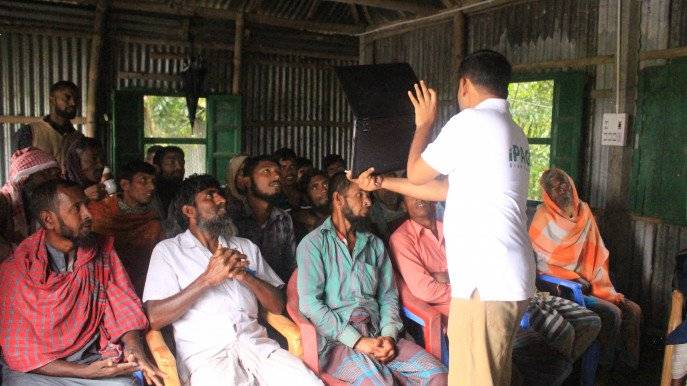
iPage (Integrated Precision Agriculture and Engineering) is demonstrating how to combine technology and agriculture to alleviate farmers' problems and improve the agro-industry using artificial intelligence, training, and workshops. Farmers across the country suffered the brunt of the Covid-19 lockdowns last year when their supply chains came to a halt.
"The pandemic produced a significant disturbance in distribution, which we rarely consider. We produced but had no idea how to sell because everything was shut down,” said Atikullah, a farmer from Gaibandha.
"The iPage team came to us, we got to know them, and we connected them with local farmers," Abdul Mannan Akand, NGO Executive Director of Gono Unnayan Sanstha, Fulchori, Gaibandha, explained.
"They [iPage] do seminars, workshops, and use their machine to evaluate the soil," he added.
Gono Unnayan Sanstha collaborates with iPage, a national startup focusing on maximizing yield and overall productivity in the country's agro-production sector through a technologically optimized strategy.
"They just taught three young boys how to conduct soil tests so that they can assist local farmers. Soil testing is unfamiliar to the farmers in this area. They have no idea how important it is or how to go about doing it. I had never considered a machine that could test soil in real-time,” Abdul added.
Journey of iPage:
In 2019, Mashrur H. Shurid (an engineer) & Mohammad Saifullah Mithu (a lawyer) co-founded iPage. They grew enthused about business and believed that there was more to be done in Bangladesh's agriculture industry.
"Farmers are extremely vulnerable, and they are the first to be affected by any tragedy. Those that feed us don't have enough food to eat themselves. We realized that we needed to do something to help them,” Mashrur opined.
"We found three major issues that are causing our farmers to fall behind: a lack of fast soil-testing infrastructure, a lack of knowledge, and the well-known fact that farmers cannot get fair market value for their produce due to middlemen. A bridge must be designed with these three factors in mind, and this understanding has aided our startup,” said Mohammad.
The Beginning and the Operations:
With only ten farmers, iPAGE began its adventure as a B2C company. The service was first provided for free. It was, however, difficult. Farmers are accustomed to using traditional farming methods and were skeptical of the startup's proposals. Eventually, iPage had no choice except to levy a small service charge.
Later, the company switched to a B2B model and currently interacts with local NGOs under an inclusive business model. Their services have now benefited more than 1,500 farms.
iPAGE is now working on an end-to-end solution with data-driven support in production and distribution nodes. An Artificially Intelligent Agricultural Information System is the solution.
Innovative Projects took by iPage:
They developed AI-based equipment for quick soil testing as part of the Ankur project. The soil is tested in 30 to 40 minutes, revealing information on its composition, pH, and other features.
Using a variety of electronic sensors built by iPAGE, the AI collects real-time data about soil and surroundings in the production node. The AI then generates a site and crop-specific agricultural prescription based on local academic research, historical data, and government standard requirements.
Furthermore, throughout the season, iPAGE provides both training and plant protection services to growers. Ankur operations, the startup's farm advising service, handles soil testing, training, and plant protection.
Krishan was launched by iPAGE in May 2020, during the pandemic lockdown. Since then, the company has moved almost 1,000 tonnes of maize, onion, potatoes, and dry chilies from the field to the market.
The business is also seeking to expand its consulting service's crop and agro-ecological zone coverage. It would also allow them to introduce a broader range of crops to the local wholesale market.
Co-founders of iPage are of the opinion that a data-driven strategy will assist balance demand and supply in the agriculture industry in our country, while also supporting the government's aim of food security and safety.
















